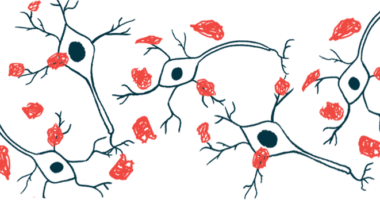Parkinson’s may be autoimmune disease in part, new study shows
New evidence from mouse study shows Parkinson’s may start in gut

Exposure to alpha-synuclein, a protein that accumulates in the brains of Parkinson’s disease patients, led to inflammation and damage to nerve cells in the gut of mice carrying a human gene associated with several autoimmune disorders, a new study showed.
Alpha-synuclein-related autoimmunity also induced constipation — a gut-related nonmotor symptom of Parkinson’s that can appear many years before the onset of motor symptoms — according to researchers.
“This shows that an autoimmune reaction can lead to what appears to be the early stages of Parkinson’s and is strong support that Parkinson’s is in part an autoimmune disease,” David Sulzer, PhD, a study co-lead and professor of neurobiology at Columbia University, in New York, said in a university news story. That story noted that Parkinson’s is generally considered a brain disorder.
“If this is the beginning of Parkinson’s in many people, we could potentially identify who has the disease before it ever reaches the brain and hopefully stop it in its tracks,” Sulzer said.
The study, “Interaction of an α-synuclein epitope with HLA-DRB1∗15:01 triggers enteric features in mice reminiscent of prodromal Parkinson’s disease,” was published in the journal Neuron.
Investigating where in body Parkinson’s disease actually starts
Alpha-synuclein is a major component of Lewy bodies, protein clumps that form inside dopaminergic neurons, or those that produce the nerve signaling molecule dopamine, in the brains of people with Parkinson’s. These clumps are thought to contribute to the loss of dopaminergic neurons and the onset of the disease’s hallmark motor symptoms.
Still, many patients experience nonmotor symptoms, such as constipation, many years before motor symptoms begin, implying that brain cell death may occur in the later stages of the disease.
Based on these findings, it has been suggested that alpha-synuclein-related disease begins in the enteric nervous system (ENS) — that which controls the digestive tract — and spreads to the brain via the vagus nerve. The vagus is the longest nerve in the body’s autonomic or so-called automatic nervous system, which controls regulatory functions such as breathing, digestion, and heart rate.
Several studies support a role for gut inflammation in the early stages of Parkinson’s. People with inflammatory bowel disease, for example, have a higher risk for Parkinson’s, and their treatment with anti-inflammatory therapies leads to a marked reduction in the incidence of the disorder.
Also, in the first decade after diagnosis, Parkinson’s patients typically test positive for immune T-cells that recognize a fragment of alpha-synuclein (alpha-synuclein32-46).
“The blood of Parkinson’s patients often contains immune cells that are primed to attack the neurons,” Sulzer said, “but it’s not clear where or when they are primed.”
This team of researchers previously had shown, in a 2017 study, that T-cells responding to the alpha-synuclein fragment were present in Parkinson’s patients who carried HLA-DRB1∗15:01, a gene associated with several autoimmune diseases, including multiple sclerosis (MS).
Results suggest Parkinson’s is in part an autoimmune disease
Now, the researchers set out to understand how the interaction between alpha-synuclein and HLA may trigger early, gut-related features of Parkinson’s. To find out, the team immunized a mouse model with alpha-synuclein32-46 that expressed a human version of HLA-DRB1∗15:01.
Following immunizations, very few healthy control mice became sick, defined as more than 12% loss of body weight and a hunched posture with ungroomed fur. In contrast, 25% of HLA mice became ill or died and showed severe weight loss and constipation, which was absent in control mice.
Tissue and cell analyses found immunized HLA mice showed a loss of neurons in the enteric nervous system around the small intestine but not in the central nervous system (CNS), which is comprised of the brain and spinal cord.
Consistently, neither control nor HLA mice displayed motor symptoms after immunizations, and a lack of immune cells, neuroinflammation, and neurodegeneration in the CNS. Those results demonstrate that immune responses were “restricted to the ENS in HLA mice,” the team noted.
“Our ultimate goal is to develop a model of Parkinson’s disease in mice that recreates the human disease process, which doesn’t exist right now,” Sulzer said. “That will be critical in answering questions about the disease that we can’t explore in people.”
It also will help in “eventually developing better therapies” for Parkinson’s, he added.
We have shown that [alpha-synuclein] autoimmunity induces constipation and gut pathology, with loss of enteric [nervous system] neurons that can elicit symptoms that resemble those of prodromal [Parkinson’s disease].
Further experiments showed that immune-mediated damage to dopaminergic neurons in the gut persisted after the HLA mice had recovered from weight loss. Immunization also led to the activation of immune-related genes and induced changes in T-cells that resemble a type of immune memory cell found in the gut lining during inflammation.
Finally, depleting a specific type of T-cell from HLA mice — called CD4 T cells — partially reduced neuronal damage in the gut, with these mice showing no differences in weight loss, constipation, and immune cells after immunization. The researchers noted that neuronal loss appeared specific only to dopaminergic neurons, while other neurons in the ENS remained unchanged.
“We have shown that [alpha-synuclein] autoimmunity induces constipation and gut pathology, with loss of enteric neurons that can elicit symptoms that resemble those of prodromal [Parkinson’s disease],” the team concluded.








